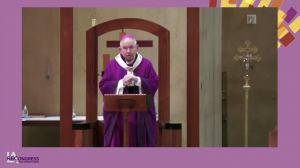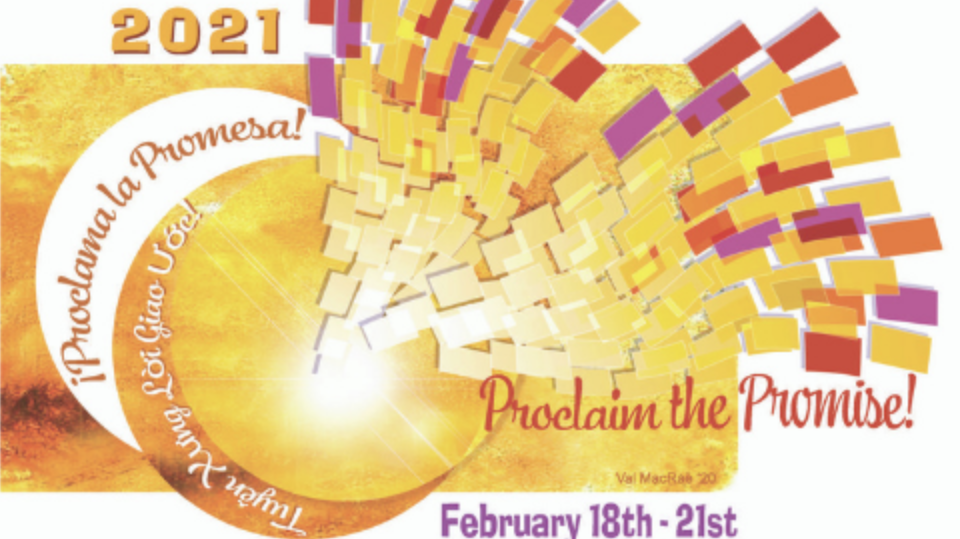From Pope Francis’ opening message urging “commitment, strength and dedication” in building a post-pandemic “tomorrow,” to Archbishop José H. Gomez’s closing homily reminding of “our duty in this moment to proclaim the truth of the divine,” the all-virtual 2021 Religious Education Congress (REC) sought to stake out a unique place in the 65-year history of the event.
The theme of the Feb. 18-21 event, “Proclaim the Promise!” was a “radical invitation” to believe our lives and our world are sustained by God’s promise, said Sister Rosalia Meza, the senior director of the Office of Religious Education. “And now more than ever we need hope and a vision for our future.”
The event’s most prominent voices seemed intent on offering participants reasons for that hope, even if they had to do so through screens. The COVID-19 pandemic, which sent much of the world into lockdown just a few weeks after last February’s congress hosted tens of thousands at the Anaheim Convention Center, left organizers no choice but to resort to a fully virtual event this year.
Still, by all accounts this year’s Congress was a success, given the circumstances: More than 10,000 participants from at least 21 countries registered for the event, according to organizers.
In his closing Mass homily, Archbishop Gomez noted that for Jesus’ own parents, “answering God’s call meant their whole lives were turned upside down,” not unlike the events of the past year.
Reminding participants of the Year of St. Joseph recently declared by Pope Francis, he made the case that “Mary and Joseph give us a beautiful example for our ministries in this moment.”
“They trusted in God’s promise of love, they trusted in his plan for their lives,” said Archbishop Gomez during the liturgy, which was celebrated in a largely empty Cathedral of Our Lady of the Angels and transmitted to participants Sunday morning. “They accepted the hard realities in their lives with the obedience of faith. They trusted that in all things he works for the good of those who love him.”
He also asked viewers to consider signs of hope, like the popularity of Father Mike Schmitz’s “The Bible in a Year,” near the top of the Apple charts since early January.
“Why do you think that this is popular?” he asked.
“In my opinion it is because people are hungry for the truth,” said Archbishop Gomez. “With all the disruption, all the unrest and uncertainty in the world and in our lives, people are looking for a true story, they’re looking for answers. They want to know God’s purposes, they want to know if there is a “plan” and how they “fit in.”

Earlier during the congress, Bishop Robert McElroy of San Diego addressed “What is Truth?” in his keynote talk. He asserted that “in this particular year of 2021, with all that we have gone through with the pandemic and all the suffering around us, I think we can focus on that part of the proclamation of the authentic Christian message: Hope rooted in truth.”
He expanded on three truths he thought were most relevant: Our radical dependence on God, the kerygma, and a Christian hope and faith that is communitarian, not individually realized.
“Pope Francis told us during the pandemic that one of the great lessons that emerged for us is we have looked at all those elements that are illusory in seeming to bring a sense of security in our lives, and we have come to understand those elements are false,” said Bishop McElroy. “They cannot make us secure. Whether it’s wealth, our careers, or family relationships — this pandemic has shaken up everything and caused us to understand we as men and women are radically dependent.”
In her keynote presentation, Sister Carol Zinn of the Sisters of St. Joseph asked directly: What is hope in the promise and hope for the world?
“I don’t know about you, but we’re living in a time in our own country that might be a little challenging to see hope in the promise and maybe for our country,” she said. “But the promise really is the question we ask ourselves: Do we believe God is good all the time, and all the time God is good?”
She then showed photographs of exotic caterpillars that turned into beautiful butterflies.
“As we know from fourth-grade science, those caterpillars are built to become something else. … Metamorphosis is way more than change. It needs stillness, solitude, and silence. Those are skills we use to have hope for the promise.”
“If I choose love, mercy, and inclusion over fear, judgment, and exclusion, regardless of the cost, I will in fact open myself to transformation.”
Instead of the dozens of workshops, liturgies, keynote speakers and author book signings in the crowded exhibitor hall, this year’s menu was reduced to some 30 workshop speakers in English, nearly 20 in Spanish and four in Vietnamese, on demand at the official congress website. They will remain available to registered participants through March 21.
Presentations were more intimate as speakers delivered talks from their home offices, bedrooms, or living rooms, and the topics focused on many critical issues in today’s world of COVID-19 recovery, post-pandemic formation, best practices in using technology for evangelization, and even social media conduct.
Bishop Robert Barron started his presentation titled “Social media and the Catholic Culture of Contempt” by confessing: “I’m missing the energy and fun of the LA congress. To me, it’s always a highlight of the year especially to speak in the great arena. But please God, this will be over in a few months and we’ll be OK.”
According to Paulette Smith, associate director of the Office of Religious Education and the event’s lead organizer, the all-virtual event attracted first-time participants who until now hadn’t been able to travel to past congresses.
Father James Martin, an annual REC favorite speaker who this year was promoting the new release of his book, “Learning to Pray,” (HarperOne, $27.99) concluded his talk by adding a personal emphasis to the standard ending each speaker was asked to deliver.
“Thanks for coming. Hope to see you next year. We pray — and here we go again, we’re going to pray together — that we will be in person for this gathering in 2022.”

